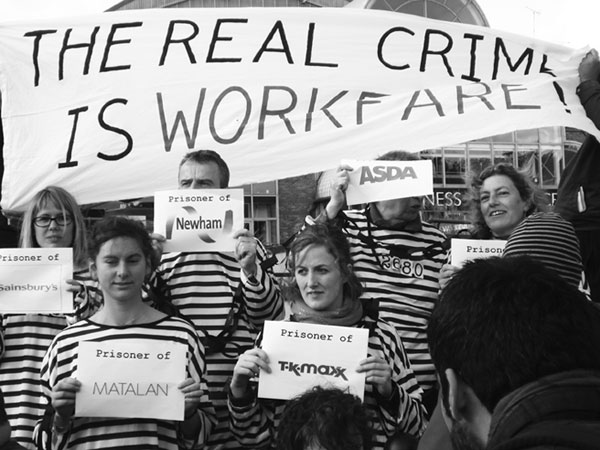
Ruling Class Rampant
The first three months of 2012 have seen the assault on working class conditions reach unprecedented levels. Cuts in Local Housing Allowance are making thousands of families and young single people homeless. The punitive Welfare Reform Bill has become law: its main aim is to cut the disability payments budget by 20%. The Health and Social Care Bill has also been passed, enabling the break-up and privatisation of the NHS. More than a third of people claiming incapacity benefit have been deemed fit for work under the vindictive assessments administered to date by Atos, and forced onto Jobseeker’s Allowance (JSA) and deeper into poverty. The April rise in the family tax credit threshold will plunge nearly half a million children into poverty. A further round of drastic cuts in local council service provision: adult and children’s social care services are being slashed across the country, libraries and day centres are being closed, services for the homeless cut. Life for working class people dependent on these services will become immeasurably harder. Robert Clough reports.
Yet with the exception of the workfare protests in February there has been no real opposition. Only 40-50 demonstrated outside councils in Islington and Liverpool as they voted to cut tens of millions of pounds from their budgets, 100 in Newcastle; the size of these protests was typical. Across the country, the scale of protests was far less than a year ago, and that was little enough. At the same time, the fight against public sector pension cuts has descended to near-farce. On 30 November 2011, up to two million public sector workers went on strike against ConDem coalition plans to make them work longer, pay more towards their pensions and get less in return when they retired. Paul Kenny, general secretary of the GMB union told the Financial Times that ‘It’s Alice in Wonderland stuff to think 30 November will happen and people will stop and take part in rallies and then go home and say, “that’s all right, now we will give in”.’ Socialist Worker summed up the views of the majority of the left when it called 30 November ‘a historic day for the trade union movement’ which ‘saw the rebirth of trade unions as a united mass movement’ (10 December 2011).
Within two weeks of the strike Paul Kenny and the GMB had signed up to a framework agreement on the local government pension scheme as had the Unison local government service group. The Royal College of Nursing followed suit in relation to the separate health service scheme, and the second largest teachers’ union, the ATL, for the teachers’ scheme.
And what of the unions which did not sign up? A snail would have moved faster. In England, the National Union of Teachers membership voted overwhelmingly for further action in a March ballot: the leadership has decided that this will be limited to one-day regional strikes. Members of the Scottish teachers union EIS voted overwhelmingly at the same time for further action: its leadership has just decided to ignore the ballot result. The higher and further education union UCU executive overturned an arbitrary decision by its general secretary Sally Hunt to sign up to the government’s offer last December. The self-same Sally Hunt was re-elected to her position in March 2012 by a three to one majority over her SWP challenger with only one in eight members taking part in the poll.
NUT members in London will strike on 28 March, three days before the government imposes its proposed pension scheme changes; UCU members in the post-1992 universities and further education colleges will also have another one-day strike, but again only in London. The NUT’s stance has given PCS, the civil servants’ union, the excuse not to strike at all on 28 March but to moot some form of joint action in April. Anything in the future rather than now.
It is evident that the trade union leaders are not prepared to jeopardise their organisations’ huge assets in a real challenge to the ruling class. Local branches of public sector trade unions are dominated by better-off workers, junior and middle management. The attack on their pensions has not been a sufficient threat to their conditions to force them to consider a course of independent action. Their privileged position may be being eroded, but the process has not gone far enough: they still have a stake in the system.
A year ago almost all the left were trumpeting what they claimed was the weakness of the ConDem coalition: it would collapse at the mere hint of resistance, they implied. We shall never know, because however weak the government may have been, the trade union fightback was infinitely weaker. Now it is evident that the unions cannot and will not stop the ruling class’s assault on working class living standards. Indeed, so contemptuous is the coalition government of the trade unions that, in the same breath, it announced a 5p cut in the 50p income tax rate for those earning more than £150,000 and the end of national pay scales for the public sector. True to form, the trade union leaders have huffed and puffed, but the ruling class can count on them to do nothing.
But it is possible to resist, and to win. The largely spontaneous Workfare protests in February 2012 rattled the businesses which until then had been quite happy to use the enforced free labour of unemployed people on JSA. Embarrassed by the publicity generated through store occupations and pickets, the bosses rounded on the government which in turn was forced to end the punitive element of JSA that had introduced slave labour. Such independent action is showing the way for those who want to challenge the ruling class onslaught.
Fight Racism! Fight Imperialism 226 April/May 2012




